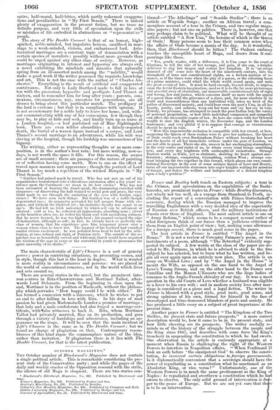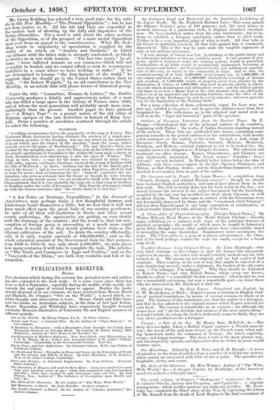OCTOBER ILA GAZINES. * TILE October number of Blackwood's Magazine does
not contain a single political article. This is remarkable considering the pre- sent state of the Conservative party ; and while the pages of the daily and weekly oracles of the Opposition resound with the strife, the silence of old Maga is eloquent. There are two stories con- . Blaclaveod's Edinburgh Magazine, No. 492. Published by Blackwood and
Sons. • Fraser's Magazine, No. 322. Published by Parker and Son.
Bentley's Miscellany, No. 238. Published by Bentley. Colburn's Nett Monthly Magazine, No. 430. Published by Chapman and Hall. Dublin Unirersity Magazine, No. 286. Published by Hodges and Co. Journal of Agriculture, No, 54. Published by Blackwood and Sons. tinned—" The Athelings" and "Seaside Studies " ; there is an article on Wayside Songs ; another on African travel; a com- monplace account of a tour in the Crimea, and two regular maga- zine papers; but not one on politics. There is, however, one that may perhaps claim to be political. What will be thought of an article entitled "A New Una," the heroine of which is the Queen of Oude ! Many persons seem to lose their common sense when the affairs of Oude become a mania of the day.. Is it wonderful, then, that Blackwood should be bitten ? The Oudean embassy touches the susceptible heart of Maga, and draws from it out- poufings like these.
"Yes, gentle reader, with a difference, it is Una come to the court of Gloriana, to tell the tale of her wrongs, and gain, if she can, a knight- deliverer to slay her dragon and restore her kingdom. It is an errant damozel of old ' come into the heart of the nineteenth century, into the stronghold of laws and constitutional rights, on a forlorn mission of ro- mance, as if the times were when the pity of a queen, or the relenting heart of a prime minister, could whirl the whole world round again, and undo the great events of fate. It must be hard enough, beyond doubt, to impress upon the fervid Eastern imagination, used as it is to the far more picturesque and graceful sway of absolutism, our immoveable constitutional ride of right and wrong, law and justice, which concerns itself no more with the appeal of a queen than with the grievance of a slave, and, far more absolute m its truth and reasonableness than any individual will, takes no heed of the pathos of discrowned majesty, and could hear even the poets Una, in all her beauty, purity, and sadness, weep out her tears and cry her cry in vain. Nobody, we presume, has attempted to teach the poor Indian lady the vanity of personal propitiation, or how little individual compassion and sympathy can affect the inexorable course of law. So here she comes with her Onental wealth to dare the English winter, the November fogs, and the London tradesmen; and very pitiful it is to suppose that courage so venturesome should be spent in vain. "How this impenetrable seclusion is compatible with her errand, or how, supposing the Queen of these realms were to give her audience, the Queen of Oude could reach even Buckingham Palace without breaking her heart and the hearts of all her immediate retinue under the gaze of London, we are not able to guess. There she sits, unseen in her unchanging atmosphere, in the very centre and midst of us, to whom every wind brim's something new, and every day brightens with unthought-of vicissitudes. Strange Eastern world, so fickle, yet so obstinate, shutting its heart against ame- lioration; strange, conquering, triumphing, restless West ; strange con- trast bringing the two together in this errand, which places our own consti- tutional Sovereign in the seat of some antique Queen of Love and Beauty, turns all our impenetrable statesmen into eager knights waiting for missions of danger, and stakes the welfare and independence of a distant kingdom upon a lady's petition !"
Fraser and Bentley both touch on Eastern subjects : a tour in the Crimea, and speculations on the capabilities of the Bashi- bazouks are prominent topics in Fraser; while Bentley discourses, not wisely nor too well, on a voya0e from Stamboul to Pesth, in- cluding the report of a conversation with Prince Gortschakoff's secretary, during which the Russian managed to impress the travelling Englishman with a very decided idea of the superiority of Russian over British officers, and the military institutions of Russia over those of England. The most salient article is one on "Army Reform," which seems to be a compact resume rather of what foreigners think of our forces than a judicious criticism of them from an English point of view; but, Thsking some allowance for a foreign accent, there is much good sense in the paper. The best article in Fraser is entitled "The Angel in the House." It is not a review of Coventry Patanore's poem, or two instalments of a poem although "The Betrothal" evidently sug- gested its subject. poem, words at the close of the paper are de- voted to Mr. Patmore, in which he is advised to stick to the fine subject he has selected, but to burn what he has written and be- gin all over again upon an entirely new plan. The article is an essay on Wedded Love ; and by the Angel in the House" is meant the Wife, as opposed on the one hand to the Angel of Love's Young Dream, and on the other hand to the Dames aux Camelias and the Manon L'Escauts who are the liege ladies of romance to the Anglo-French chivalry of our day. It was a moot question in the old Courts of Love whether a husband was eligible as a lover to his own wife ; and in modern society love after mar- riage is considered as a pious and a legal fiction. The writer in Fraser is blessed with a good style, good taste, good sense, and strong opinions of his own, formed for himself in the face of stereo d time-honoured blunders of poets and society. He has produced an a little essay on a subject of great importance at the present time. Another paper in Fraser is entitled "The Kingdom of the Two Sicilies, its present state and future prospects." A more correct description would be, how it came to be in its present state, and how little cheering are its prospects. The writer usefully re- minds us of the history of the struggle between the people and the King since 1847, and describes with some force the King's treachery in suspending the constitution to which he had sworn. One observation in the article is curiously, appropriate at a moment when Russia is challenging the right of the Western Powers to interfere in Neapolitan affairs. "When Ferdinand II took an oath before the omnipotent God' to observe the consti- tution, he incurred certain obligations to foreign governments. Is it diplomatically convenient that a sovereign should have the power of repudiating as a constitution what he sanctioned as an Absolutist King, or vice versa?" Unfortunately, one of the Western Powers is in much the same predicament as the King of Naples : he repudiated and overthrew a constitution which he sworn to observe. The only solid ground of intervention is d
ger to the peace of Europe. But we are not yet sure that th is to be an intervention.
Kr. Cyrus Redding has selected a very good topic for his arti- cle in the New Monthly—"The Present Oppopition" ; but he has not done justice to it. All his wit and logic are expended in the useless task of showing up the folly and impotence of the Derby-Disraelites. Not a word is said about the other sections of the Opposition, or of the prospect of a more useful 011 sition
1
next year from an appeal to the constituencies. What . Red- ding wants in singularity of speculation is supplied by the writer of an article on "Austria and Sardinia," in which our alliance with the latter state is strongly condemned, as likely to involve us in war with Austria. "The last two years, " he af- firms, "have inflicted wounds on our commerce which not so readily be healed, and we cannot afford so soon to recommence hostilities in a cause where we have nothing at stake." If we are determined to become "the Don Quixote of the world," he suggests that we should go to the Ignited States rather than to Italy. "Sir Robert Walpole," by an old contributor to the New Monthly, is an article that will please lovers of historical gossip.
Under the title " Lamartine, Homme de Lettres," the Dublin University produces a kindly and appreciatory notice of a man who has filled a large space in the history of France since 1848, and of whom the next generation will probably speak more sym- pathizingly than the present. Another paper we have glanced at,—" A King's Tour "—is a genial notice of the old cities of Belgium apropos of the late festivities in honour of King Leo- pold. From a number of anecdotes scattered through the article we select the following.
MALBROOK.
"A trifling circumstance led to the popularity of the song in France. The ill-starred Marie Antoinette having obtained the services of a simple pea- sant-woman as nurse to the Dauphin, was one day struck by the smartness of an air which, says the relater of the anecdote, made the young prince open his eyes to the name of Marlborough !' The gay Queen's fancy was touched by the sprightly tune; even the King took up the refrain ; and from the private apartments of Versailles to the stables the song made a furore in Paris, Beaumarchais even introducing it into his opera of Figaro.' The thing, in fact, took; a rage for the name was evinced in many ways ; stuffs, silks, ragouts, carriages, furniture, received the stamp of fashion with the title of lllalbrook ; in short, 'nothing but the fall of the Bastile put a stop to the furore' ; and it was revived again when Napoleon, albeit he had no taste for music, took to humming the air! 'Indeed,' concludes the an- tiquarian, who goes as seriously into the theme as though he were tracing the source of some heroic poem, we are inclined to think with Monsieur de Chateaubriand, that it is very probably the same air as that sung by Godfrey de Bouillon under the walls of Jerusalem ' ! This flourish of trumpets winds up with the brazen assurance that the Arabs chant it to this day.'"
"A few Notes on Drainage Expenditure," in the Journal of Agriculture, may perhaps make a few thoughtful farmers and landowners bestir themselves a little, but we fear that it will not have much effect upon the great body of our country gentlemen. In spite of all their self-laudation at Bucks and other recent county gatherings, the squirearchy are getting on very slowly with the drainage of the country ; and the result is, that our con- sumption of foreign grain is proceeding at a much more rapid pace than it woad do if they would perform their duty as the efficient cultivators of the soil. To drain the country effectually, will, it is said, require upwards of 100,000,000!.; and as the whole expended amount of the Government loan for that purpose, from 1846 to 1855-'6, was only about 2,500,000/., we may guess how many centuries it will take to complete the task. The articles on "The Trade and Commerce in Eggs and Poultry," and on the "Vineyards of the Rhine," are both very readable and full of in- formation.



































 Previous page
Previous page